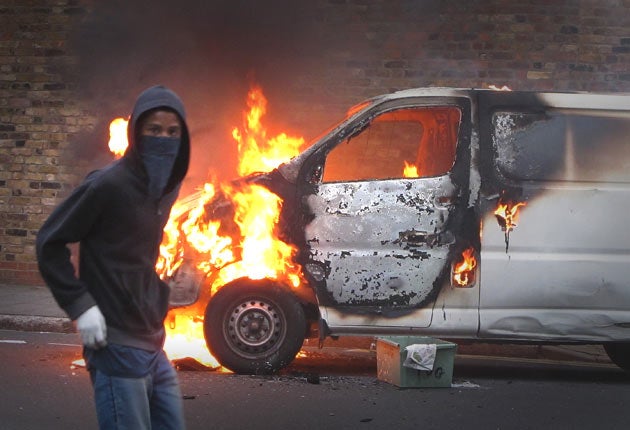Media alarm as police force TV crews to hand over riot footage

Broadcasting vehicles surrounded by mobs and wrecked, a radio van burnt out, a presenter pelted with bottles, and numerous reporters and photographers beaten and robbed of cameras, laptops and phones. These were the journalistic casualties of August's riots.
Last night fears were expressed that the reporting of public disturbances in Britain would become even more dangerous, following the revelation that three leading broadcasters and at least one national newspaper have been forced by police to hand over hundreds of hours of unbroadcast footage and photographs of the riots.
Scotland Yard has used court orders to obtain material from the BBC, ITN, Sky News and The Daily Telegraph.
The Metropolitan Police said: "The police are identifying people through pictures, CCTV and through the media to ensure that people are brought to justice. We would ask the media to work with the police to ensure that happens."
It is rare for news organisations to hand over such material and when it has been requested by police in the past it has been challenged through the courts. The development could be seen as a further blow to the British media. Scotland Yard recently used the Official Secrets Act to try to compel journalists to hand over their sources and Lord Justice Leveson is preparing his inquiry into press standards in the wake of the phone-hacking scandal.
The Channel 4 newsreader Jon Snow voiced concerns about the development. "Media [is] now regarded as in concert with police in all public-order clashes," he said. He asked: "Should riot footage be handed over so lightly?"
Since August's violence, photographers have formed a group, Snapperweb, to share safety advice. Film crews have started using small cameras that allow greater mobility.
But the latest court orders are likely to blur the distinctions between the Fourth Estate and the law enforcement authorities, said Barry Fitzpatrick, head of publishing at the National Union of Journalists."We are there to report news for the public, not to be used as a source of evidence for the police to prosecute people," he said.
Yesterday the BBC said: "We require requests for untransmitted material to be made through the courts. A production order requiring footage of the riots was served on the BBC and a court agreed that the material should be supplied."
An ITN spokesperson said: "ITN's policy is that we do not release unbroadcast material to police." Similarly Sky News said that its standard policy was not to supply material to the police. The Daily Telegraph is understood to have complied with a court order early this month.
Dangers on the front line
BBC reporters Richard Stead and Ruth Clegg were forced to flee on foot after BBC Manchester's radio van was attacked by a mob and set on fire at the height of the riots last month. Stead managed to record the sound of the van coming under attack and being pelted with bricks.
Another BBC producer Paraic O'Brien was driving a broadcasting van through Croydon when its back window was smashed by rioters intent on looting local shops. In Hackney, east London, Paul Lewis, a journalist for The Guardian, had to run to avoid a mob as he gave a radio interview on the trouble. "I've seen three journalists attacked, quite badly, thrown to the floor and beaten by a group of youths. It gets very dangerous, anyone here considered to be taking images or recording what's going on is attacked."
Susannah Ireland, photographer for The Independent, took every precaution she could to keep a low profile while picturing the disturbances. "I take pictures under my coat so that the camera doesn't get snatched," she says. "If you are too overt when they are looting they will mug you there and then, even right in front of the police."
Freelance photographer Jess Hurd wore a skateboard helmet for protection but on the second night of rioting she helped a photographer colleague to hospital after he was attacked. She said children as young as 12 were making death threats to journalists.
Ian Burrell